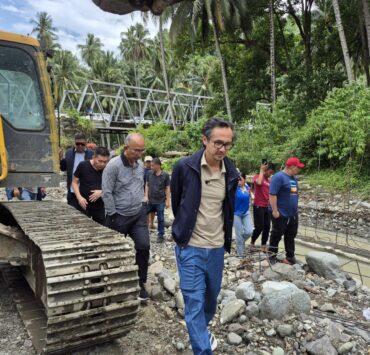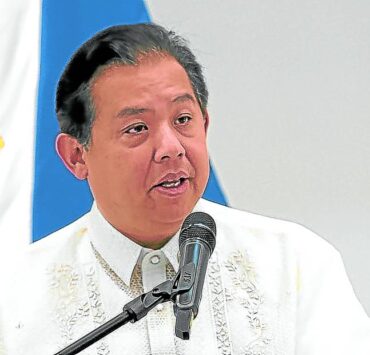Some foreign firms feeling effect of PH graft probes

European companies in the construction sector and operating in the Philippines have incurred lower sales as an offshoot of allegations linking lawmakers and contractors to anomalies in flood control projects.
“Because of some of those projects that are being put on hold, they have already experienced a reduction in sales, and it might go on for the next couple of weeks or months,” said Florian Gottein, executive director of the European Chamber of Commerce of the Philippines (ECCP).
Companies in the construction industry that produces materials for infrastructure projects were affected “to some extent,’’ Gottein told reporters on the sidelines of the Arangkada Phillippines Investment Forum 2025.
“They really are already experiencing it. Their sales are going down when it comes to construction materials,” Gottein said. He did not provide the specific number of companies or projects affected by the controversy.
So far, the ECCP has not received any inquiries from potential investors, while European investors are closely monitoring the situation and discussing the matter with the chamber, he said.
Allegations of senators, congressmen and contractors siphoning off funds for flood control projects across the country over the past three years of the Marcos administration have come tumbling out of congressional inquiries.
In the biggest rally yet, tens of thousands of Filipinos took to the streets last Sunday to protest corruption in government and demand that the erring officials and their accomplices be charged in court and jailed.
‘Temporary slowdown’
Meanwhile, budget officials admitted that the Department of Public Works and Highways’ (DPWH) review of projects—including flood control works flagged for alleged corruption—may cause short-term disruptions to the government’s infrastructure program, a development that could potentially drag on growth.
The Department of Budget and Management (DBM) said in its latest disbursement report that “temporary slowdown” is expected as the DPWH verifies completed projects and enforces stricter checks on billings and payment claims.
It added that the DPWH had since lifted the suspension on bidding and procurement for local projects to ensure continuity while tightening safeguards against corruption.
Some P255.5 billion had been slashed from the DPWH’s proposed 2026 outlay following President Marcos’ order to conduct a sweeping review of its original P881.3-billion budget. All flood control undertakings without foreign funding assistance, duplicate or completed projects, as well as rock-netting and cat’s eye jobs were removed.
The DBM said that infrastructure spending is expected to “normalize and catch up” later this year.
‘Thorough’ investigation
While it is too soon to assess the government’s response, Gottein said the ECCP is confident that officials will immediately resolve these corruption issues.
“But we trust in the government and the responsible government organizations to investigate and immediately act on the findings as well,” he said.
“Everybody is just expecting that it will be investigated in a fast and thorough manner, and things will be put in place that will prevent similar situations from happening again,” he added.
On top of the inquiries by the Senate and the House of Representatives, the government-created Independent Commission for Infrastructure (ICI) has opened its own investigation of the anomalies.
Beyond corruption, Gottein raised the “high cost” of doing business in the country as one of the more pressing concerns.
“If you compare the cost of doing business here in the country to other countries in the region, it’s higher here and I think corruption plays into that. Because when you want to participate in government-funded projects, there are kickbacks,” he said.
“What we also see now 25 percent, 30 percent of the projects are being siphoned off. That also plays into the topic of why the cost of doing business is so high in the Philippines,” he added.
Looking ahead, a spending rebound would be critical for the Marcos administration to stay on track with its 5.5 to 6.5 percent growth goal this year, which hinges partly on keeping infrastructure outlays at 5 to 6 percent of gross domestic product.
Latest data from the DBM showed capital outlays sagged by 22.8 percent year-on-year to P114.5 billion in July. This sent the seven-month figure to P858 billion, down by 2.9 percent.
Of the total capital outlays, direct spending on infrastructure dipped by 25.3 percent to P93.3 billion in July. Since January, such expenditures amounted to P713.5 billion, declining by 3.2 percent.
The DBM said the contraction stemmed from “muted disbursement performance” of the DPWH during the month. It added that such a performance had to do with the “timing and phasing of various infrastructure activities.”
The DPWH also faced delays in some procurement activities and progress billings. At the same time, contractors had to comply with new requirements for tax clearance, which they need to secure so they can be fully paid for the projects.

















